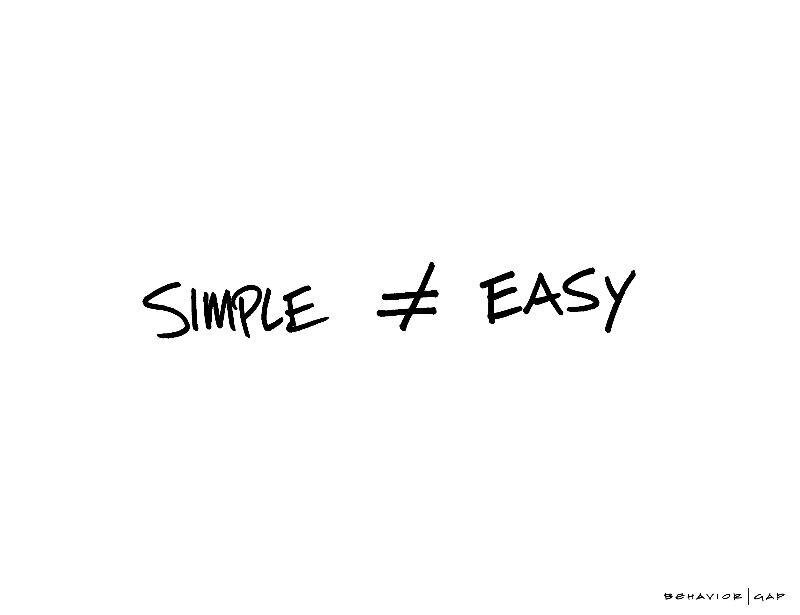Simple, not easy
Simple, not easy.
It is a phrase that applies to many things in life. Warren Buffett famously said it about investing. And it certainly applies when it comes to nutrition and health.
While there may be some arguments about the specifics, the basics of living a healthy life are very simple and well known. Move your body, reduce stress, eat lots of fruits & vegetables, avoid processed food, eat high quality protein & whole grains, drink water.
If it is so simple and well known, then why isn’t everyone living a healthy life? And why do I have a job??
Well, it might be simple, but it is certainly not easy. Our problem isn’t a knowledge problem, it is a behavior problem. We know what to do (or can just Google what to do), but we often struggle to implement that knowledge and actually change our behaviors.
It takes a lot of courage, determination, resilience, and dedication to change a habit. But the good news is that once a habit is changed, it takes a lot less work to stick with that habit. Dare I say it even becomes easy.
Below are some of my favorite tips to make habit change and healthy living a little easier:
Stack your habits. Pair something you already do with a habit you want to add. Maybe you want to start meditating so you decide you will meditate for 5 minutes every day while you brew your coffee/tea in the morning. Or if you want to add stretching to your evening routine, then you can stretch while you watch your favorite show every night. This is a powerful way to seamlessly add new habits to your life.
Set yourself up for success. One of the simplest ways to make eating healthy easier is to not have your biggest temptations around. If you know that you are unable to resist that bag of cheese puffs or chocolate chip cookies, then do not keep them in the house. It will be much easier for you to resist buying them than to resist eating them when you are stressed or having a craving.
Track your progress. Get a calendar and start tracking the days that you stick with your new habit. Whether it is meditating, exercising, reading, or eating healthy, put an X on the calendar for every day you did what you wanted to do. It is powerful motivation to see all the X’s in a row and have a visual representation of your progress.
Don’t make it a pattern. There will be days that you mess up and skip your good habit or fall back into your bad habit. That’s okay, things happen, and everyone gets off track at some point. The key is how you respond to these blips. If you want to stay on track with your goals, then you need to focus on not making it a pattern. If you skipped a workout, no problem, just don’t skip two in a row. If you ate an unhealthy meal, not a big deal, but go back to eating healthy for the next meal. By immediately going back to your good habits, you will continue your progress, rather than forming a new pattern based on bad habits.
Create go to strategies for stress. Stress is inevitable and is one of the most common things that will derail good habits. Create a list of things that will help you deal with stress in a healthier way. Keep the list on your phone or tape it to your refrigerator so it is easily accessible. Some ideas include - taking a brief walk outside, doing 20 jumping jacks, playing your favorite music, meditating, reading, and talking with a friend.
Choose your words wisely. There have been studies that have shown that when you say “I don’t” versus “I can’t” it has a powerful effect on whether or not you stick to your habit. For example, if you are trying to cut out sugar, saying “I don’t eat sugar” will be much more empowering and powerful than saying “I can’t eat sugar” which feels limiting and restrictive. Notice how you are speaking and choose more affirming and empowering words to help stick to your habits.
Make good behaviors easy, and bad behaviors hard. Especially when you are first starting a new habit, you will probably look for any excuse to not do the thing. So, try to make it as easy as possible. If you want to start exercising in the morning, put your workout clothes right next to your bed so they are ready to go when you wake up. If you want to drink more water, always have your water bottle with you. To eat more fruits & vegetables, keep them front and center in your fridge and on your counter. Conversely, you can make it more difficult to access the less healthy food – keep it in a higher cabinet, behind some other things so you have to do a little work to find them. Find ways to make the good behaviors easier, and the bad behaviors harder.
Get an accountability partner. Whether it is a friend or working with a health coach, having someone who you can check in with, will help you immensely when you are trying to implement new habits. Working with a coach will be especially helpful because they can help you personalize solutions to your specific needs and situation.
Hope these tips help make healthy living and habit change a little easier for you. And if you would like personalized support, reach out and set up a call!


